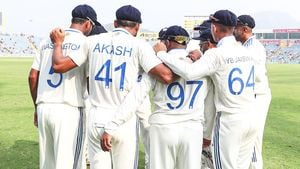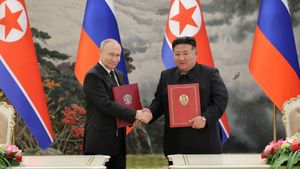India's political scene is abuzz with the debate over the 'One Nation, One Election' initiative, a proposal aimed at synchronizing the elections for the Lok Sabha and state assemblies. This idea seeks to optimize election cycles and reduce the costs of conducting multiple elections at different times. Proponents believe it could lead to more consistent governance, aligning the priorities of the central and state governments more closely.
Prime Minister Narendra Modi has championed this initiative, arguing it would strengthen democracy and governance through increased stability. Speaking during various public events, he stressed the importance of unity among the different branches of government. Modi likened the need for simultaneous elections to the collective strength of the armed forces, emphasizing how each arm contributes to national security.
Addressing the initiative on the occasion of Sardar Vallabhbhai Patel's birth anniversary, Modi noted, "Today, when we are moving so fast toward the goal of developed India, you all are protectors of this dream." He mentioned the imperative of not compromising on the nation’s borders, linking national security to domestic political stability.
Critics, including leaders from the opposition parties, have raised significant concerns. Congress president Mallikarjun Kharge has labeled the proposal as impractical, claiming it risks diluting democratic processes. Kharge stated, "One Nation, One Election is impossible; PM Modi is trying to fool people." His party argues this could lead to voter fatigue, as regular electoral engagement diminishes, eroding the connection citizens feel to both local and national representatives.
Regional leaders have echoed these sentiments. Mehbooba Mufti, leader of the People's Democratic Party, asserted the BJP has turned Jammu and Kashmir "into a testing ground for its policies," insinuations of undue experimentation at the expense of genuine democratic processes. These leaders fear the initiative could disproportionately benefit the ruling party at both national and state levels by consolidizing their electoral strengths.
Supporters of the proposal argue it could bring long-term stability and reduce the frequency of elections, which often distract governments from governance. They point to differences between the election schedules of the Lok Sabha and various state assemblies, ascribing inefficiencies to the current staggered model.
The debate has reignited discussions about federalism and the allocation of power between the central and state governments. Many political analysts have suggested the initiative may centralize power, diminishing the autonomy of state governments and their ability to respond to local issues.
To add complexity to the discussion, the electoral system of India isn’t solely about logistics; it’s also about stark regional differences and diverse voters' needs. Critics argue the ‘One Nation, One Election’ model risks sidelining unique regional issues and candidates, potentially suffocates localized campaigns under the weight of national narratives.
Despite protests from detractors, the Modi administration seems undeterred. Planning for electoral reforms, the government has formed committees to explore the practicalities involved, including legal changes needed to accommodate simultaneous elections.
The proposed model has received mixed reactions from various political factions. Left-leaning parties argue the plan is about consolidational power, whereas some center-right observers contemplate whether increased electoral efficiency might help address public disillusionment with the legislative process.
Nevertheless, there lies substantial public sentiment favoring consistent governance structure, as citizens yearn for visible responses to their grievances more effectively than current protracted electoral cycles allow.
The complexity surrounding 'One Nation, One Election' paints as much of its opposition with concerns about the underlying motives behind such policies as it does support by those arguing for electoral efficiency. Political campaigns currently showcase candidate individuality and local suggestions, but whether they'll remain as the mainstay of political engagement under such reforms is open to question.
Signals from political leaders suggest we might witness more debates across state assemblies and the Lok Sabha relating to this agenda as the next rounds of elections approach. The central government’s efforts to push this ambitious goal might lead to intriguing confrontations between traditional political structures and new approaches to governance.
Overall, as India strides forth with its head held high amid calls for national efficiency and unity, the differing political ideologies and contestations mark its path toward establishing cohesive governance systems. The discourse surrounding 'One Nation, One Election' mirrors more than procedural debates; it touches upon the very fabric of how India's democracy operates and how its diverse voices can be heard and represented.



